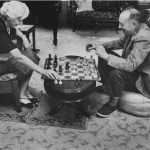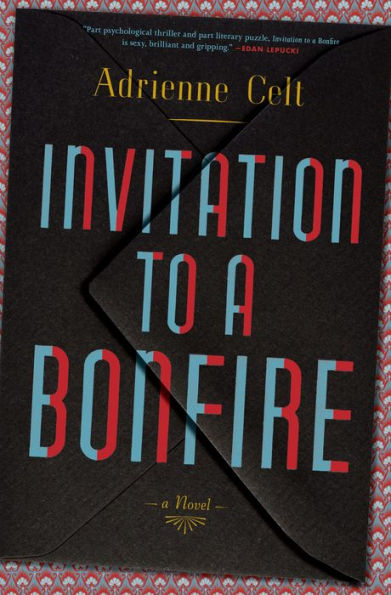In the wake of World War I, the Russian Revolution, widespread famine, and the first political purges, seven million Russian children were left homeless. The American Relief Administration led foreign assistance efforts while the Soviets established an inadequate number of orphanages in the late 1920s. It was from one of those grim institutions that the Americans rescued a girl named Zoya Andropova, transplanting her at the Donne School in Maple Hill, New Jersey.
Zoya’s voice, heard through diary entries written in June and July of 1931, dominates the narrative of Invitation to a Bonfire, Adrienne Celt’s second novel. The diary comprises part of a collection of documents related to the death of Leo (Lev) Orlov, a Russian émigré novelist who taught at the Donne School in the period immediately following Zoya’s graduation. Lev’s worshipful letters to his wife Vera, one of the school’s “most generous benefactors,” complement the archive. The moments of Lev’s letters, mailed from Russia where he attempted to recover a draft of his first novel, coincide with the time of Zoya’s American diary. She tells us that “I will burn this diary shortly” – thus, the bonfire.
 “Let me begin by saying I did not think it would end this way,” the first sentence of Zoya’s diary, erects in a flash the armature on which the “end” of Lev will be hung. But Celt takes her time before Lev appears. The first half of the novel follows Zoya from her youth in Moscow and the disappearance of her father through her years as an outsider among the privileged girls of the Donne School. But Vera is present from the beginning since Zoya had encountered her in Russia: “A girl with a riding crop in her hand, a girl who snuck cigarettes from soldiers and wore a new gown for the season’s every occasion. … I knew her but we didn’t run in the same circles.”
“Let me begin by saying I did not think it would end this way,” the first sentence of Zoya’s diary, erects in a flash the armature on which the “end” of Lev will be hung. But Celt takes her time before Lev appears. The first half of the novel follows Zoya from her youth in Moscow and the disappearance of her father through her years as an outsider among the privileged girls of the Donne School. But Vera is present from the beginning since Zoya had encountered her in Russia: “A girl with a riding crop in her hand, a girl who snuck cigarettes from soldiers and wore a new gown for the season’s every occasion. … I knew her but we didn’t run in the same circles.”
Zoya’s acutely observed and sometimes trenchant remarks about Donne and her classmates establish her separateness and apprehensions – but she is a stolid character. Although violence and death are foreshadowed on page one, and have been absorbed experientially by Zoya as she speaks, Celt chooses to trick her out as rather tightly wrapped and remains loyal to the era’s expressive conventions. Upon graduation, Zoya obtains a job in the school’s greenhouse – and there she encounters Lev. She is cornered, captured, entirely swept up by him. There is no post-affair analysis, but Zoya’s perspective suggests an exile’s craving for recombination:
 “I felt – my tongue grew very warm. I wanted to touch his neck, to smell his hair. I wanted him to reach into my mouth and count my teeth and see what the years had done to me. It was sex, but it was also the rest, unspoken: that we’d lost more than money when we lost our homes. That we didn’t just escape a bad situation when we snuck across the border, we’d allowed our whole world to be washed away. Grammar, subject, object, tense. And that somehow together we could tally up those losses more completely …”
“I felt – my tongue grew very warm. I wanted to touch his neck, to smell his hair. I wanted him to reach into my mouth and count my teeth and see what the years had done to me. It was sex, but it was also the rest, unspoken: that we’d lost more than money when we lost our homes. That we didn’t just escape a bad situation when we snuck across the border, we’d allowed our whole world to be washed away. Grammar, subject, object, tense. And that somehow together we could tally up those losses more completely …”
Hovering over them is the calculating Vera, pulling the strings of Lev’s career and emotions. Celt’s publisher is quick to point out that the novel is inspired by the figures of Vladimir and Vera Nabakov – and is based on creative speculation: What would Vera, already obsessed with her husband’s genius, have done if he had ventured to wrest himself from her grip? At the moment Lev sends such a signal to Vera, the novel morphs seamlessly from an émigré’s Bildungsroman to a Russo-noir caper. And since it is 2018 and not 1931, Celt will not allow a powerful man to exploit a susceptible young woman without paying a price.
It may seem at times that Zoya’s motive for writing this diary in the first place never quite clarifies. But her expressiveness is a matter of self-disclosure to an imaginary reader, an indulging of her secret interior for her own pleasure. After all, she has lived through unsharable terrors in Russia and alienation in America. By the novel’s strangely gratifying conclusion, Lev’s pending death has become less concerning than one’s sudden if flickering insight into Zoya’s character when she says, “But who was I to judge people, to judge war, when I had run into the arms of my captors with a grateful cry at being rescued by the Party faithful? Later letting myself be smuggled out of the home for girls and onto a boat when I realized there was no fidelity except to life. No creed of truth, no heart that’s home. I’m beginning to change my mind about this, but it’s taken an awfully long time.”
[Published by Bloomsbury on June 5, 2018. 246 pages, $26.00]